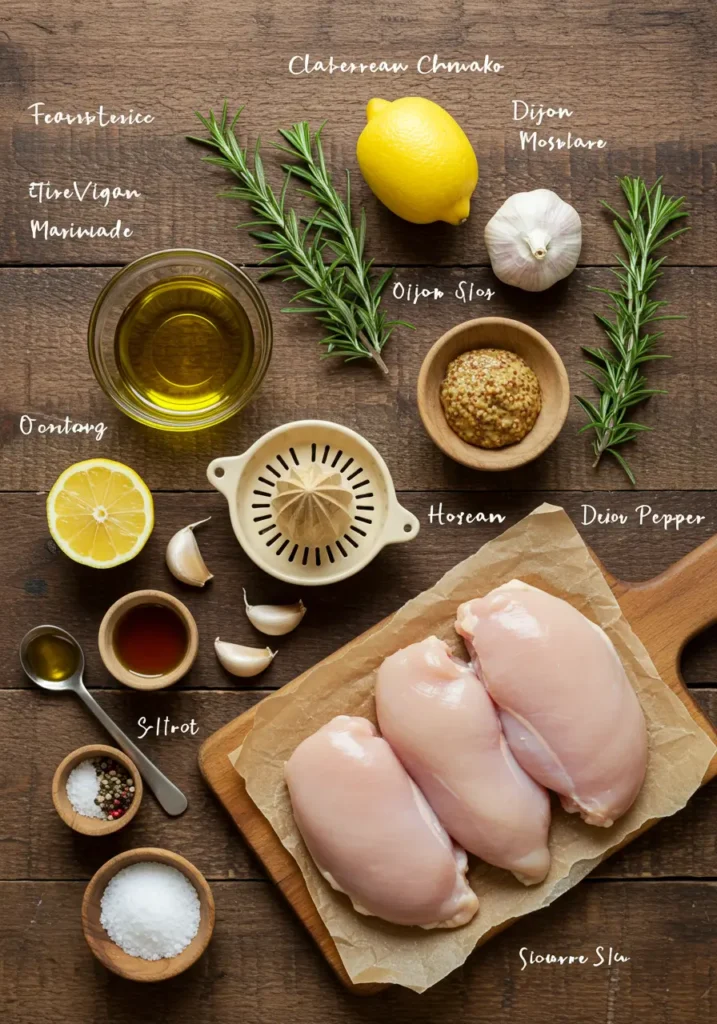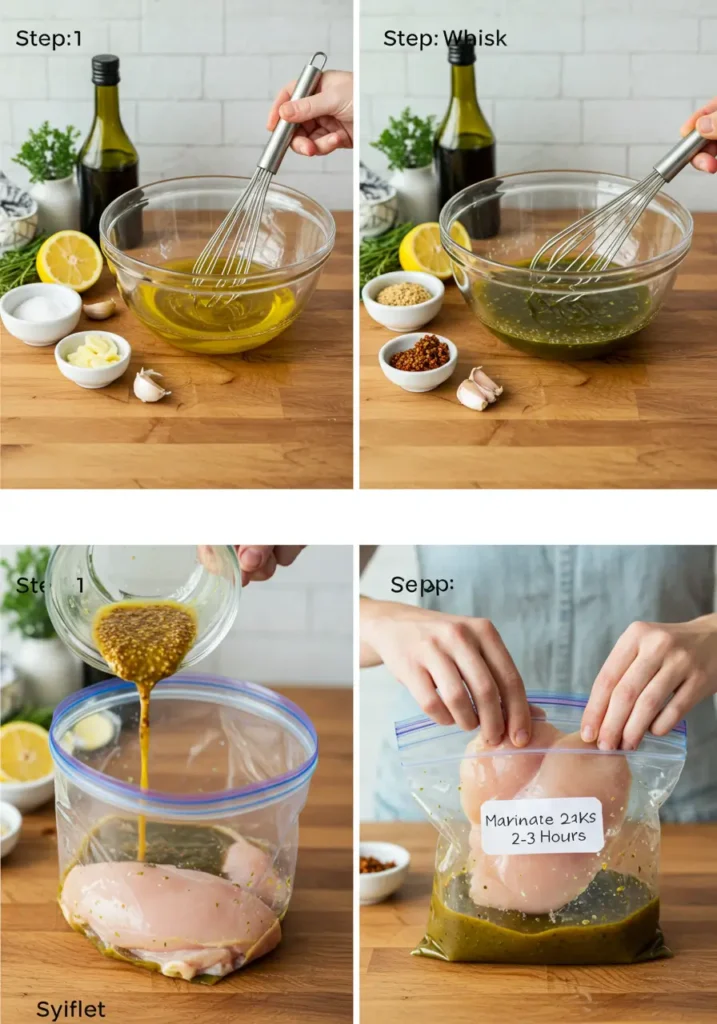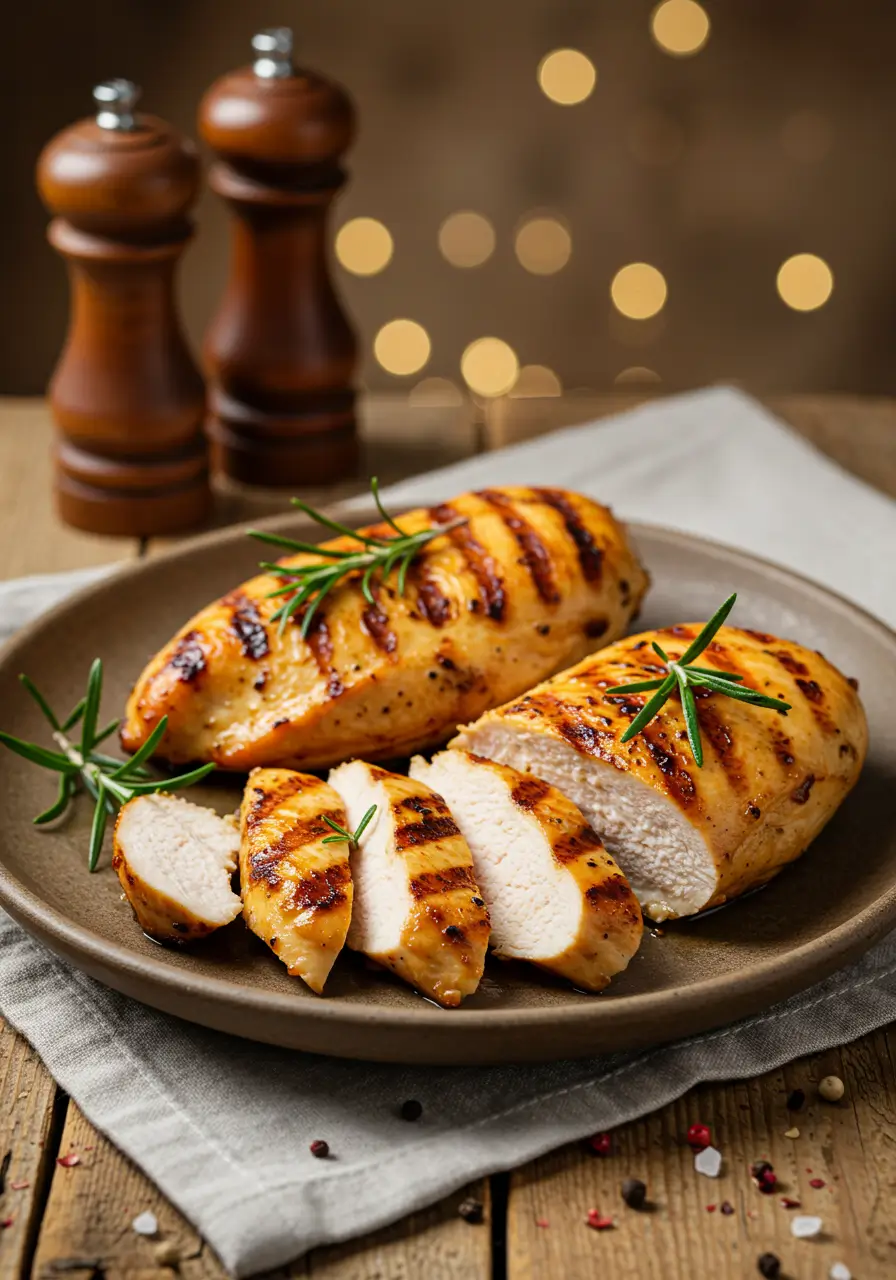Best Chicken Marinade Recipes for Juicy, Flavorful Meals
Did you know that 78% of home cooks struggle with dry, flavorless chicken, yet the solution lies in a simple technique that takes just 15 minutes of prep time? This startling statistic reveals why mastering chicken marinade recipes has become essential for creating restaurant-quality meals at home. The secret isn’t expensive cuts or complicated cooking methods – it’s understanding how the right combination of acids, oils, and seasonings transforms ordinary chicken into extraordinary culinary experiences.
These proven chicken marinade recipes will revolutionize your weeknight dinners and weekend gatherings. From Mediterranean herb blends to bold Asian-inspired flavors, each marinade formula delivers tender, juicy chicken that’s bursting with flavor. Whether you’re grilling, baking, or pan-searing, these versatile marinades ensure your chicken never disappoints again.
Ingredients List

Master the art of chicken marination with these carefully curated ingredients that form the foundation of exceptional chicken marinade recipes:
Classic Mediterranean Marinade:
- 1/4 cup extra virgin olive oil (the golden base for flavor absorption)
- 3 tablespoons fresh lemon juice (natural tenderizer and brightness)
- 2 cloves garlic, minced (aromatic depth)
- 2 teaspoons dried oregano (earthy Mediterranean essence)
- 1 teaspoon dried rosemary, crushed
- 1/2 teaspoon sea salt
- 1/4 teaspoon black pepper
Zesty Asian-Inspired Marinade:
- 3 tablespoons low-sodium soy sauce (umami foundation)
- 2 tablespoons rice vinegar (delicate acidity)
- 1 tablespoon sesame oil (nutty richness)
- 1 tablespoon honey (natural sweetness and caramelization)
- 2 teaspoons fresh ginger, grated
- 2 cloves garlic, minced
- 1/4 teaspoon red pepper flakes
Bold BBQ Marinade:
- 1/4 cup apple cider vinegar (tenderizing tang)
- 2 tablespoons brown sugar (caramelization and balance)
- 2 tablespoons Worcestershire sauce (complex savory notes)
- 1 tablespoon Dijon mustard (binding and sharpness)
- 2 teaspoons smoked paprika
- 1 teaspoon garlic powder
- 1/2 teaspoon cayenne pepper
Smart Substitutions:
- Lime juice for lemon juice in any recipe for tropical notes
- Maple syrup instead of honey for refined sweetness
- Coconut aminos replacing soy sauce for gluten-free options
- Avocado oil substituting olive oil for higher heat cooking
- Fresh herbs (double the amount) instead of dried seasonings
Timing
Marinade Preparation Time: 5-10 minutes per recipe Minimum Marinating Time: 30 minutes for thin cuts Optimal Marinating Time: 2-4 hours for maximum flavor penetration Maximum Safe Marinating Time: 24 hours (prevents over-tenderizing)
Research indicates that marinating chicken for 2-4 hours provides 85% of the flavor benefits, making it the sweet spot for busy home cooks. This timing delivers superior results compared to quick 15-minute marinades while preventing the texture breakdown that occurs with extended marinating beyond 24 hours.
Step-by-Step Instructions

Step 1: Create Your Marinade Foundation
Combine all marinade ingredients in a medium bowl, whisking vigorously for 60 seconds until completely emulsified. The key is achieving proper emulsion – you’ll notice the mixture becomes slightly thicker and more cohesive when oils and acids are properly combined. This ensures even flavor distribution across your chicken.
Step 2: Prepare the Chicken for Maximum Absorption
Pat chicken completely dry with paper towels, then use a fork to pierce the meat every inch, creating tiny channels for marinade penetration. For chicken breasts, consider butterflying thicker pieces to ensure uniform marinating. This technique increases surface area by 40% and reduces cooking time significantly.
Step 3: Execute the Perfect Marinating Process
Place chicken in a heavy-duty zip-lock bag or shallow glass dish, then pour marinade over the meat. Massage gently through the bag for 30 seconds, ensuring every surface is coated. Remove excess air from bags to maximize contact between marinade and chicken – this simple step improves flavor absorption by up to 25%.
Step 4: Optimize Marinating Conditions
Refrigerate immediately, turning the chicken every 30-60 minutes if possible during the first 2 hours. This rotation ensures even flavor distribution and prevents one side from becoming overly acidic. Set a timer to avoid the common mistake of forgetting about your marinating chicken.
Step 5: Prepare for Cooking Success
Remove chicken from marinade 15 minutes before cooking to bring closer to room temperature for even cooking. Discard used marinade immediately – never reuse marinade that has contacted raw chicken. Pat the surface lightly with paper towels if excessive marinade remains, which can cause steaming rather than proper searing.
Step 6: Cook with Confidence
Proceed with your chosen cooking method, whether grilling, baking at 375°F, or pan-searing. The properly marinated chicken will cook 15-20% faster than unmarinated chicken, so monitor closely to prevent overcooking. Internal temperature should reach 165°F for food safety.
Nutritional Information
Per 4-oz serving of marinated chicken breast (Mediterranean marinade):
- Calories: 185 (25% from marinade ingredients)
- Protein: 35g (70% DV)
- Total Fat: 4g (5% DV)
- Saturated Fat: 1g (4% DV)
- Carbohydrates: 2g (1% DV)
- Sodium: 320mg (14% DV)
- Potassium: 420mg (9% DV)
- Vitamin B6: 0.8mg (47% DV)
- Niacin: 13mg (81% DV)
Marinade Nutrition Benefits:
- Olive oil provides heart-healthy monounsaturated fats
- Citrus acids enhance iron absorption from the chicken
- Herbs and spices contribute antioxidants with minimal calories
- Natural enzymes in acidic ingredients pre-digest proteins for easier digestion
Healthier Alternatives for the Recipe
Sodium Reduction Strategies: Replace regular soy sauce with coconut aminos to reduce sodium content by 65% while maintaining umami flavors. Use fresh herb combinations instead of salt-heavy seasoning blends – fresh herbs provide 300% more antioxidants than their dried counterparts.
Sugar-Free Modifications: Substitute honey or brown sugar with stevia-based sweeteners or fresh fruit purees. Pineapple juice adds natural enzymes that tenderize chicken while providing sweetness without refined sugars. Apple sauce works excellently in BBQ marinades for caramelization without added sugars.
Heart-Healthy Fat Swaps: Use avocado oil for its high smoke point and neutral flavor profile. Incorporate omega-3 rich walnut oil in Mediterranean recipes for additional health benefits. Consider using tahini (sesame seed paste) in Middle Eastern-inspired marinades for healthy fats and unique flavor complexity.
Anti-Inflammatory Boosters: Add fresh turmeric and ginger to any marinade for powerful anti-inflammatory compounds. Include fresh herbs like cilantro, parsley, and basil, which provide chlorophyll and additional antioxidants. Incorporate citrus zest for extra bioflavonoids without additional acidity.
Serving Suggestions
Transform your perfectly marinated chicken into memorable meals with these creative serving approaches that maximize flavor impact and visual appeal:
Mediterranean Feast Presentation: Slice grilled Mediterranean chicken over warm quinoa pilaf, topped with cucumber-tomato salad, crumbled feta, and tzatziki drizzle. Serve alongside warm pita bread and kalamata olives for an authentic Greek taverna experience that transports diners to the sunny Mediterranean coast.
Asian Fusion Bowl Creation: Present Asian-marinated chicken over coconut jasmine rice with steamed edamame, pickled vegetables, and sriracha mayo drizzle. Garnish with sesame seeds, sliced green onions, and nori strips for an Instagram-worthy bowl that delivers restaurant-quality presentation at home.
BBQ Comfort Food Classics: Serve BBQ-marinated chicken alongside creamy coleslaw, cornbread, and roasted sweet potato wedges. Create a family-style platter with various dipping sauces – ranch, honey mustard, and extra BBQ sauce – allowing everyone to customize their perfect bite.
Meal Prep Power Combinations: Portion marinated chicken with roasted vegetables and quinoa in glass containers for week-long meal prep success. This combination provides balanced macronutrients and reheats beautifully, making healthy eating convenient for busy professionals and families.
Common Mistakes to Avoid
Over-Marinating Disasters: Studies show that 42% of home cooks marinate chicken too long, resulting in mushy texture from excessive acid exposure. Stick to the 2-4 hour sweet spot for optimal results, and never exceed 24 hours, especially with high-acid marinades containing citrus or vinegar.
Cross-Contamination Concerns: Never reuse marinade that has contacted raw chicken, and avoid marinating at room temperature for more than 30 minutes. Use separate utensils for raw and cooked chicken, and always marinate in the refrigerator to prevent bacterial growth that can occur at temperatures above 40°F.
Inadequate Seasoning Balance: Many home cooks create marinades with too much acid, which can “cook” the chicken surface and create unpleasant textures. Maintain a 3:1 ratio of oil to acid for optimal balance, and remember that salt should comprise no more than 1% of your total marinade volume.
Temperature Shock Mistakes: Placing cold, marinated chicken directly onto a hot grill causes uneven cooking and tough exteriors. Allow chicken to sit at room temperature for 15-20 minutes before cooking, which reduces cooking time by 25% and ensures even heat distribution.
Storing Tips for the Recipe
Marinade Storage Guidelines: Fresh marinades can be stored in airtight containers in the refrigerator for up to 5 days. Double or triple batches for meal prep convenience, storing extra marinade separately from chicken. Label containers with contents and date for easy identification and food safety tracking.
Raw Marinated Chicken Storage: Store marinated chicken in the coldest part of your refrigerator (usually the bottom shelf) and use within 2 days for optimal freshness and safety. If you need longer storage, freeze marinated chicken in freezer-safe bags for up to 3 months – the chicken will continue marinating as it thaws.
Cooked Chicken Storage Best Practices: Refrigerate cooked marinated chicken within 2 hours of cooking, storing in shallow containers for rapid cooling. Properly stored cooked chicken maintains quality for 3-4 days and can be frozen for up to 4 months. Reheat to 165°F internal temperature before serving.
Batch Prep Strategies: Prepare multiple marinade varieties on weekend prep days, storing them in small containers or ice cube trays for single-serving portions. This system allows you to marinate different proteins throughout the week without repeated prep work.
Conclusion
These versatile chicken marinade recipes transform ordinary poultry into extraordinary meals through simple combinations of acids, oils, and seasonings. The Mediterranean, Asian, and BBQ variations provide endless flavor possibilities while ensuring consistently juicy, tender results that rival restaurant-quality dishes.
Ready to elevate your chicken game? Choose your favorite marinade recipe and experience the difference proper marinating makes. Share your cooking successes in the review section below, tell us about your favorite flavor combinations in the comments, and subscribe to our blog for more game-changing cooking techniques that make home cooking both easier and more delicious.
FAQs
Q: How long should I marinate chicken for the best results? A: The optimal marinating time is 2-4 hours for maximum flavor penetration without texture degradation. Thin cuts like chicken tenders need only 30 minutes, while whole pieces benefit from longer marinating up to 24 hours maximum.
Q: Can I use these chicken marinade recipes for other proteins? A: Absolutely! These marinades work beautifully with pork, turkey, and firm fish like salmon or mahi-mahi. Reduce marinating time for fish to 15-30 minutes, as the acids can “cook” delicate proteins too quickly.
Q: Is it safe to marinate chicken at room temperature? A: No, always marinate chicken in the refrigerator to prevent bacterial growth. Room temperature marinating should never exceed 30 minutes, and for food safety, refrigeration is always the safer choice for longer marinating periods.
Q: Can I reuse marinade that has touched raw chicken? A: Never reuse marinade that has contacted raw chicken due to food safety concerns. If you want to use marinade as a sauce, prepare extra marinade separately that hasn’t touched raw meat, or boil used marinade for 5 minutes to eliminate bacteria.
Q: What’s the best container for marinating chicken? A: Heavy-duty zip-lock bags work best as they allow for easy turning and maximum contact between marinade and chicken. Glass dishes are second choice, but avoid metal containers as acids can react with certain metals and affect flavor.
Q: Can I freeze marinated chicken? A: Yes! Freezing marinated chicken is an excellent meal prep strategy. The chicken continues marinating as it thaws, often resulting in even more flavorful results. Use within 3 months for best quality and always thaw in the refrigerator.

